Hospitality Destination Planning and Development in London, UK Report
VerifiedAdded on 2021/10/13
|11
|2273
|88
Report
AI Summary
This report offers a comprehensive analysis of tourism planning and development, focusing on London as a case study. It begins by defining tourism and its policy implications, highlighting various approaches such as stakeholder, environmental, community-based, economic, and quality approaches. The report then delves into the implementation of holistic tourism planning for sustainable development in London, outlining key stages and the importance of community involvement. It further explores the role of tourism planning as a catalyst for regenerating and developing London as a tourism destination, emphasizing the social, economic, and environmental benefits derived from events like the Olympic Games. The report concludes by underscoring the significance of the tourism industry and its positive impact on London's economy and overall development.

Hospitality Destination
Planning & Development
Planning & Development
Paraphrase This Document
Need a fresh take? Get an instant paraphrase of this document with our AI Paraphraser
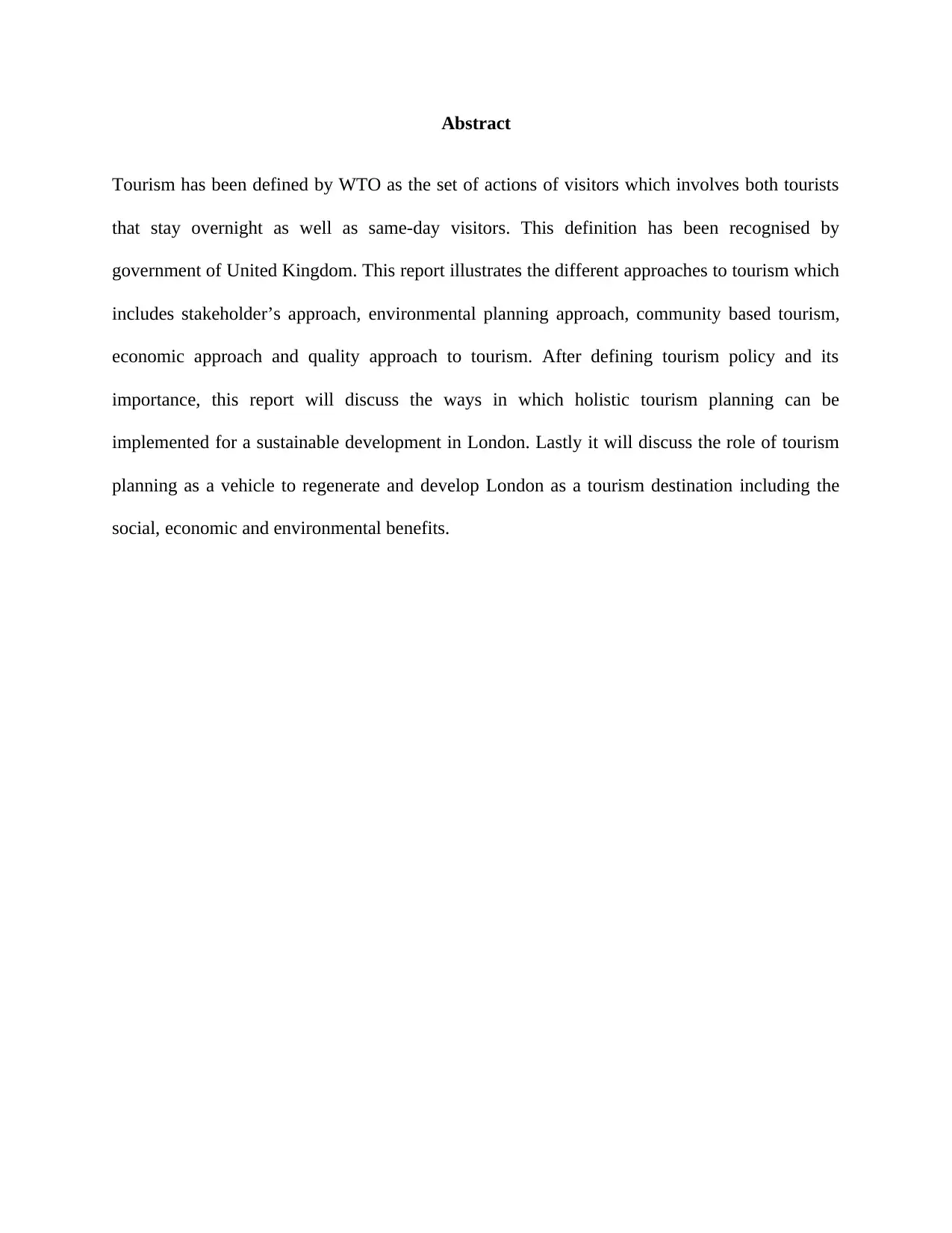
Abstract
Tourism has been defined by WTO as the set of actions of visitors which involves both tourists
that stay overnight as well as same-day visitors. This definition has been recognised by
government of United Kingdom. This report illustrates the different approaches to tourism which
includes stakeholder’s approach, environmental planning approach, community based tourism,
economic approach and quality approach to tourism. After defining tourism policy and its
importance, this report will discuss the ways in which holistic tourism planning can be
implemented for a sustainable development in London. Lastly it will discuss the role of tourism
planning as a vehicle to regenerate and develop London as a tourism destination including the
social, economic and environmental benefits.
Tourism has been defined by WTO as the set of actions of visitors which involves both tourists
that stay overnight as well as same-day visitors. This definition has been recognised by
government of United Kingdom. This report illustrates the different approaches to tourism which
includes stakeholder’s approach, environmental planning approach, community based tourism,
economic approach and quality approach to tourism. After defining tourism policy and its
importance, this report will discuss the ways in which holistic tourism planning can be
implemented for a sustainable development in London. Lastly it will discuss the role of tourism
planning as a vehicle to regenerate and develop London as a tourism destination including the
social, economic and environmental benefits.
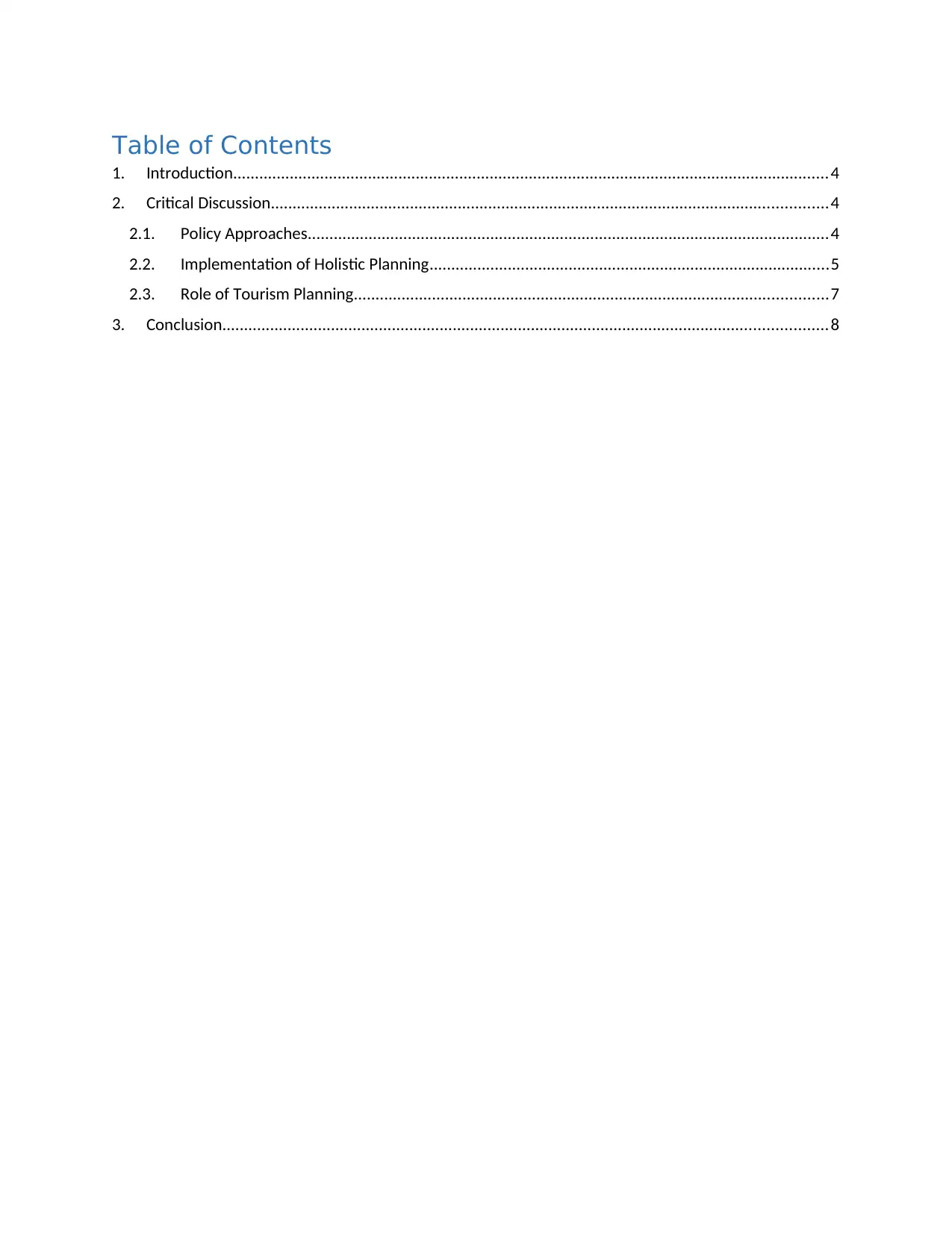
Table of Contents
1. Introduction.........................................................................................................................................4
2. Critical Discussion................................................................................................................................4
2.1. Policy Approaches........................................................................................................................4
2.2. Implementation of Holistic Planning............................................................................................5
2.3. Role of Tourism Planning.............................................................................................................7
3. Conclusion...........................................................................................................................................8
1. Introduction.........................................................................................................................................4
2. Critical Discussion................................................................................................................................4
2.1. Policy Approaches........................................................................................................................4
2.2. Implementation of Holistic Planning............................................................................................5
2.3. Role of Tourism Planning.............................................................................................................7
3. Conclusion...........................................................................................................................................8
⊘ This is a preview!⊘
Do you want full access?
Subscribe today to unlock all pages.

Trusted by 1+ million students worldwide
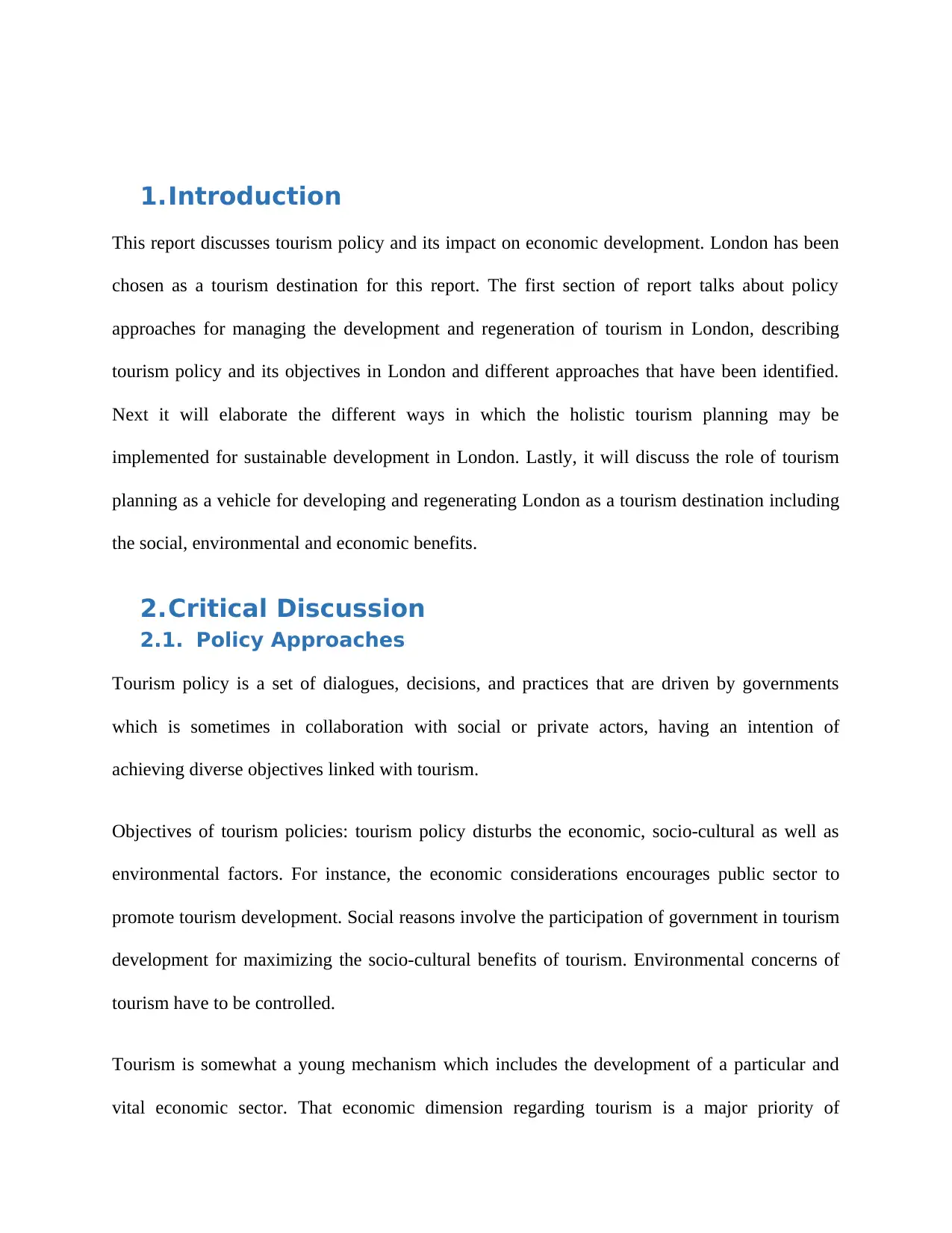
1.Introduction
This report discusses tourism policy and its impact on economic development. London has been
chosen as a tourism destination for this report. The first section of report talks about policy
approaches for managing the development and regeneration of tourism in London, describing
tourism policy and its objectives in London and different approaches that have been identified.
Next it will elaborate the different ways in which the holistic tourism planning may be
implemented for sustainable development in London. Lastly, it will discuss the role of tourism
planning as a vehicle for developing and regenerating London as a tourism destination including
the social, environmental and economic benefits.
2.Critical Discussion
2.1. Policy Approaches
Tourism policy is a set of dialogues, decisions, and practices that are driven by governments
which is sometimes in collaboration with social or private actors, having an intention of
achieving diverse objectives linked with tourism.
Objectives of tourism policies: tourism policy disturbs the economic, socio-cultural as well as
environmental factors. For instance, the economic considerations encourages public sector to
promote tourism development. Social reasons involve the participation of government in tourism
development for maximizing the socio-cultural benefits of tourism. Environmental concerns of
tourism have to be controlled.
Tourism is somewhat a young mechanism which includes the development of a particular and
vital economic sector. That economic dimension regarding tourism is a major priority of
This report discusses tourism policy and its impact on economic development. London has been
chosen as a tourism destination for this report. The first section of report talks about policy
approaches for managing the development and regeneration of tourism in London, describing
tourism policy and its objectives in London and different approaches that have been identified.
Next it will elaborate the different ways in which the holistic tourism planning may be
implemented for sustainable development in London. Lastly, it will discuss the role of tourism
planning as a vehicle for developing and regenerating London as a tourism destination including
the social, environmental and economic benefits.
2.Critical Discussion
2.1. Policy Approaches
Tourism policy is a set of dialogues, decisions, and practices that are driven by governments
which is sometimes in collaboration with social or private actors, having an intention of
achieving diverse objectives linked with tourism.
Objectives of tourism policies: tourism policy disturbs the economic, socio-cultural as well as
environmental factors. For instance, the economic considerations encourages public sector to
promote tourism development. Social reasons involve the participation of government in tourism
development for maximizing the socio-cultural benefits of tourism. Environmental concerns of
tourism have to be controlled.
Tourism is somewhat a young mechanism which includes the development of a particular and
vital economic sector. That economic dimension regarding tourism is a major priority of
Paraphrase This Document
Need a fresh take? Get an instant paraphrase of this document with our AI Paraphraser
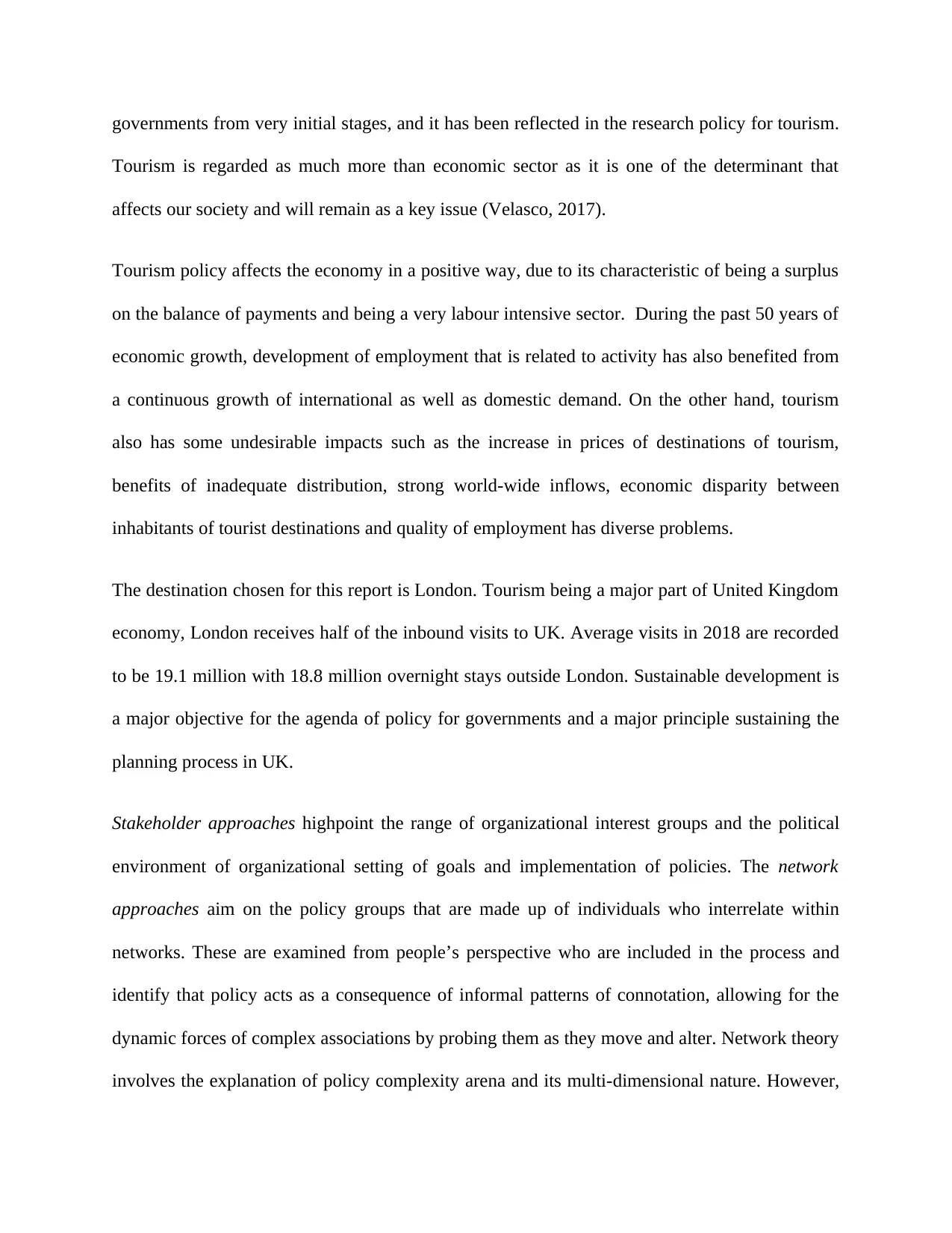
governments from very initial stages, and it has been reflected in the research policy for tourism.
Tourism is regarded as much more than economic sector as it is one of the determinant that
affects our society and will remain as a key issue (Velasco, 2017).
Tourism policy affects the economy in a positive way, due to its characteristic of being a surplus
on the balance of payments and being a very labour intensive sector. During the past 50 years of
economic growth, development of employment that is related to activity has also benefited from
a continuous growth of international as well as domestic demand. On the other hand, tourism
also has some undesirable impacts such as the increase in prices of destinations of tourism,
benefits of inadequate distribution, strong world-wide inflows, economic disparity between
inhabitants of tourist destinations and quality of employment has diverse problems.
The destination chosen for this report is London. Tourism being a major part of United Kingdom
economy, London receives half of the inbound visits to UK. Average visits in 2018 are recorded
to be 19.1 million with 18.8 million overnight stays outside London. Sustainable development is
a major objective for the agenda of policy for governments and a major principle sustaining the
planning process in UK.
Stakeholder approaches highpoint the range of organizational interest groups and the political
environment of organizational setting of goals and implementation of policies. The network
approaches aim on the policy groups that are made up of individuals who interrelate within
networks. These are examined from people’s perspective who are included in the process and
identify that policy acts as a consequence of informal patterns of connotation, allowing for the
dynamic forces of complex associations by probing them as they move and alter. Network theory
involves the explanation of policy complexity arena and its multi-dimensional nature. However,
Tourism is regarded as much more than economic sector as it is one of the determinant that
affects our society and will remain as a key issue (Velasco, 2017).
Tourism policy affects the economy in a positive way, due to its characteristic of being a surplus
on the balance of payments and being a very labour intensive sector. During the past 50 years of
economic growth, development of employment that is related to activity has also benefited from
a continuous growth of international as well as domestic demand. On the other hand, tourism
also has some undesirable impacts such as the increase in prices of destinations of tourism,
benefits of inadequate distribution, strong world-wide inflows, economic disparity between
inhabitants of tourist destinations and quality of employment has diverse problems.
The destination chosen for this report is London. Tourism being a major part of United Kingdom
economy, London receives half of the inbound visits to UK. Average visits in 2018 are recorded
to be 19.1 million with 18.8 million overnight stays outside London. Sustainable development is
a major objective for the agenda of policy for governments and a major principle sustaining the
planning process in UK.
Stakeholder approaches highpoint the range of organizational interest groups and the political
environment of organizational setting of goals and implementation of policies. The network
approaches aim on the policy groups that are made up of individuals who interrelate within
networks. These are examined from people’s perspective who are included in the process and
identify that policy acts as a consequence of informal patterns of connotation, allowing for the
dynamic forces of complex associations by probing them as they move and alter. Network theory
involves the explanation of policy complexity arena and its multi-dimensional nature. However,
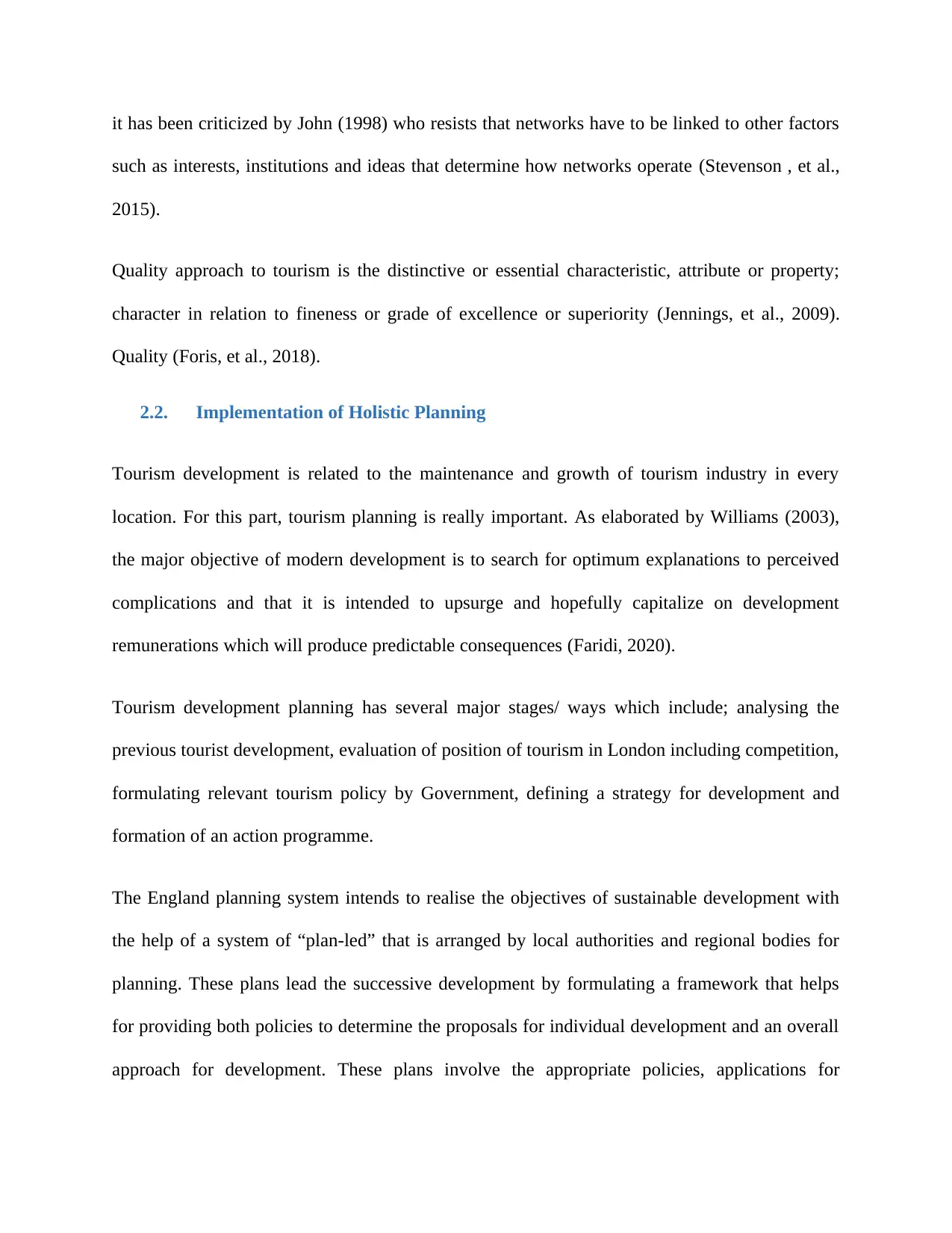
it has been criticized by John (1998) who resists that networks have to be linked to other factors
such as interests, institutions and ideas that determine how networks operate (Stevenson , et al.,
2015).
Quality approach to tourism is the distinctive or essential characteristic, attribute or property;
character in relation to fineness or grade of excellence or superiority (Jennings, et al., 2009).
Quality (Foris, et al., 2018).
2.2. Implementation of Holistic Planning
Tourism development is related to the maintenance and growth of tourism industry in every
location. For this part, tourism planning is really important. As elaborated by Williams (2003),
the major objective of modern development is to search for optimum explanations to perceived
complications and that it is intended to upsurge and hopefully capitalize on development
remunerations which will produce predictable consequences (Faridi, 2020).
Tourism development planning has several major stages/ ways which include; analysing the
previous tourist development, evaluation of position of tourism in London including competition,
formulating relevant tourism policy by Government, defining a strategy for development and
formation of an action programme.
The England planning system intends to realise the objectives of sustainable development with
the help of a system of “plan-led” that is arranged by local authorities and regional bodies for
planning. These plans lead the successive development by formulating a framework that helps
for providing both policies to determine the proposals for individual development and an overall
approach for development. These plans involve the appropriate policies, applications for
such as interests, institutions and ideas that determine how networks operate (Stevenson , et al.,
2015).
Quality approach to tourism is the distinctive or essential characteristic, attribute or property;
character in relation to fineness or grade of excellence or superiority (Jennings, et al., 2009).
Quality (Foris, et al., 2018).
2.2. Implementation of Holistic Planning
Tourism development is related to the maintenance and growth of tourism industry in every
location. For this part, tourism planning is really important. As elaborated by Williams (2003),
the major objective of modern development is to search for optimum explanations to perceived
complications and that it is intended to upsurge and hopefully capitalize on development
remunerations which will produce predictable consequences (Faridi, 2020).
Tourism development planning has several major stages/ ways which include; analysing the
previous tourist development, evaluation of position of tourism in London including competition,
formulating relevant tourism policy by Government, defining a strategy for development and
formation of an action programme.
The England planning system intends to realise the objectives of sustainable development with
the help of a system of “plan-led” that is arranged by local authorities and regional bodies for
planning. These plans lead the successive development by formulating a framework that helps
for providing both policies to determine the proposals for individual development and an overall
approach for development. These plans involve the appropriate policies, applications for
⊘ This is a preview!⊘
Do you want full access?
Subscribe today to unlock all pages.

Trusted by 1+ million students worldwide
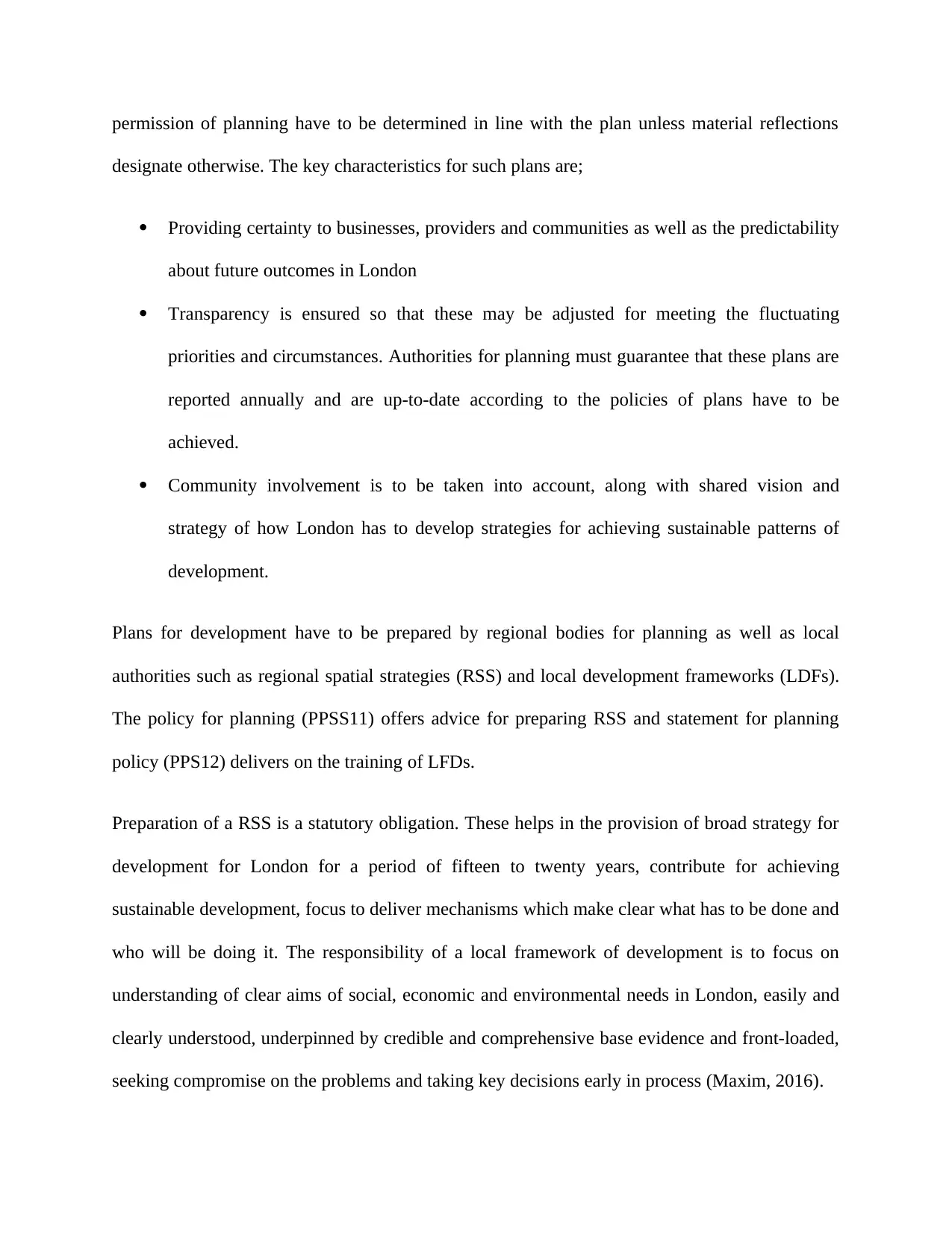
permission of planning have to be determined in line with the plan unless material reflections
designate otherwise. The key characteristics for such plans are;
Providing certainty to businesses, providers and communities as well as the predictability
about future outcomes in London
Transparency is ensured so that these may be adjusted for meeting the fluctuating
priorities and circumstances. Authorities for planning must guarantee that these plans are
reported annually and are up-to-date according to the policies of plans have to be
achieved.
Community involvement is to be taken into account, along with shared vision and
strategy of how London has to develop strategies for achieving sustainable patterns of
development.
Plans for development have to be prepared by regional bodies for planning as well as local
authorities such as regional spatial strategies (RSS) and local development frameworks (LDFs).
The policy for planning (PPSS11) offers advice for preparing RSS and statement for planning
policy (PPS12) delivers on the training of LFDs.
Preparation of a RSS is a statutory obligation. These helps in the provision of broad strategy for
development for London for a period of fifteen to twenty years, contribute for achieving
sustainable development, focus to deliver mechanisms which make clear what has to be done and
who will be doing it. The responsibility of a local framework of development is to focus on
understanding of clear aims of social, economic and environmental needs in London, easily and
clearly understood, underpinned by credible and comprehensive base evidence and front-loaded,
seeking compromise on the problems and taking key decisions early in process (Maxim, 2016).
designate otherwise. The key characteristics for such plans are;
Providing certainty to businesses, providers and communities as well as the predictability
about future outcomes in London
Transparency is ensured so that these may be adjusted for meeting the fluctuating
priorities and circumstances. Authorities for planning must guarantee that these plans are
reported annually and are up-to-date according to the policies of plans have to be
achieved.
Community involvement is to be taken into account, along with shared vision and
strategy of how London has to develop strategies for achieving sustainable patterns of
development.
Plans for development have to be prepared by regional bodies for planning as well as local
authorities such as regional spatial strategies (RSS) and local development frameworks (LDFs).
The policy for planning (PPSS11) offers advice for preparing RSS and statement for planning
policy (PPS12) delivers on the training of LFDs.
Preparation of a RSS is a statutory obligation. These helps in the provision of broad strategy for
development for London for a period of fifteen to twenty years, contribute for achieving
sustainable development, focus to deliver mechanisms which make clear what has to be done and
who will be doing it. The responsibility of a local framework of development is to focus on
understanding of clear aims of social, economic and environmental needs in London, easily and
clearly understood, underpinned by credible and comprehensive base evidence and front-loaded,
seeking compromise on the problems and taking key decisions early in process (Maxim, 2016).
Paraphrase This Document
Need a fresh take? Get an instant paraphrase of this document with our AI Paraphraser
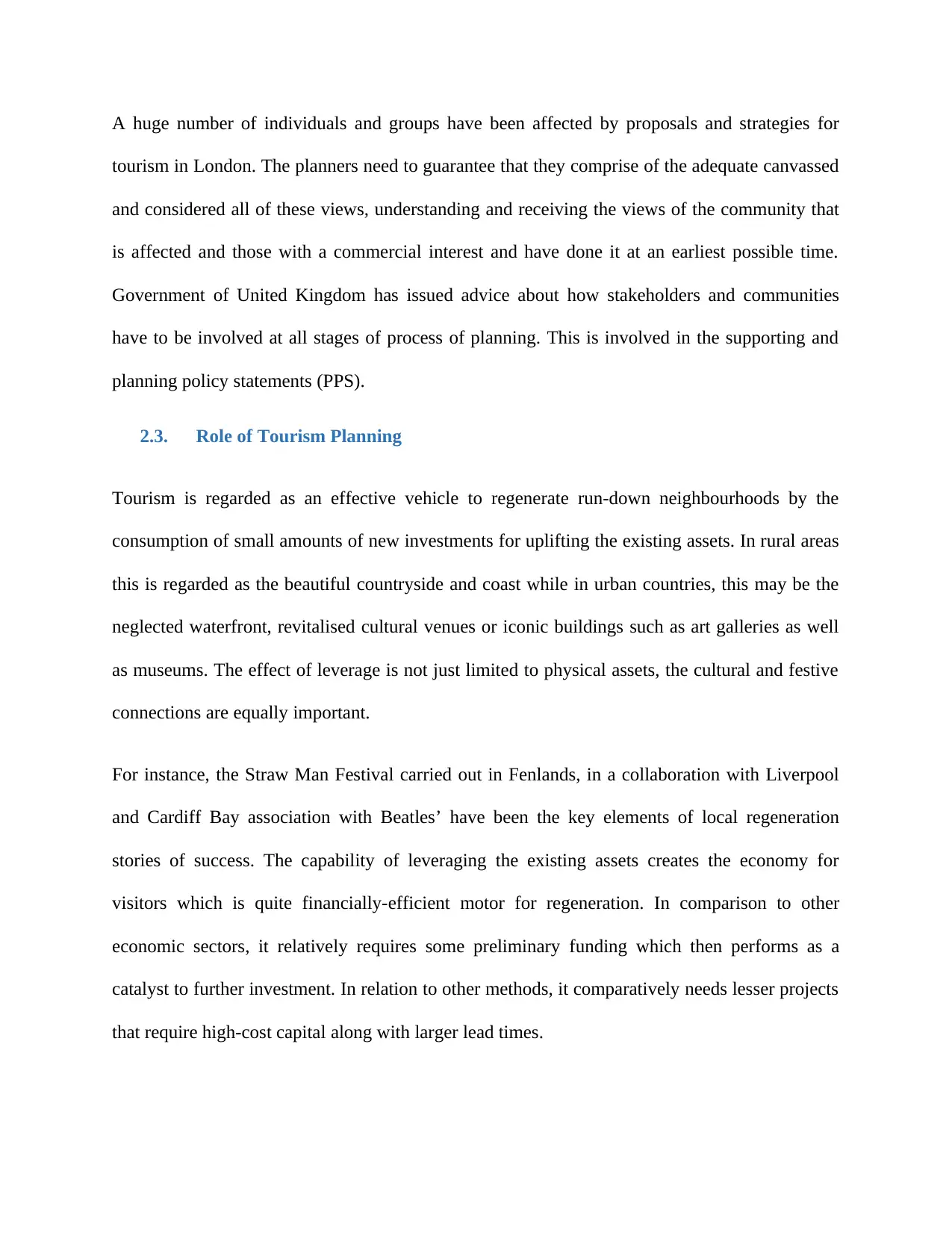
A huge number of individuals and groups have been affected by proposals and strategies for
tourism in London. The planners need to guarantee that they comprise of the adequate canvassed
and considered all of these views, understanding and receiving the views of the community that
is affected and those with a commercial interest and have done it at an earliest possible time.
Government of United Kingdom has issued advice about how stakeholders and communities
have to be involved at all stages of process of planning. This is involved in the supporting and
planning policy statements (PPS).
2.3. Role of Tourism Planning
Tourism is regarded as an effective vehicle to regenerate run-down neighbourhoods by the
consumption of small amounts of new investments for uplifting the existing assets. In rural areas
this is regarded as the beautiful countryside and coast while in urban countries, this may be the
neglected waterfront, revitalised cultural venues or iconic buildings such as art galleries as well
as museums. The effect of leverage is not just limited to physical assets, the cultural and festive
connections are equally important.
For instance, the Straw Man Festival carried out in Fenlands, in a collaboration with Liverpool
and Cardiff Bay association with Beatles’ have been the key elements of local regeneration
stories of success. The capability of leveraging the existing assets creates the economy for
visitors which is quite financially-efficient motor for regeneration. In comparison to other
economic sectors, it relatively requires some preliminary funding which then performs as a
catalyst to further investment. In relation to other methods, it comparatively needs lesser projects
that require high-cost capital along with larger lead times.
tourism in London. The planners need to guarantee that they comprise of the adequate canvassed
and considered all of these views, understanding and receiving the views of the community that
is affected and those with a commercial interest and have done it at an earliest possible time.
Government of United Kingdom has issued advice about how stakeholders and communities
have to be involved at all stages of process of planning. This is involved in the supporting and
planning policy statements (PPS).
2.3. Role of Tourism Planning
Tourism is regarded as an effective vehicle to regenerate run-down neighbourhoods by the
consumption of small amounts of new investments for uplifting the existing assets. In rural areas
this is regarded as the beautiful countryside and coast while in urban countries, this may be the
neglected waterfront, revitalised cultural venues or iconic buildings such as art galleries as well
as museums. The effect of leverage is not just limited to physical assets, the cultural and festive
connections are equally important.
For instance, the Straw Man Festival carried out in Fenlands, in a collaboration with Liverpool
and Cardiff Bay association with Beatles’ have been the key elements of local regeneration
stories of success. The capability of leveraging the existing assets creates the economy for
visitors which is quite financially-efficient motor for regeneration. In comparison to other
economic sectors, it relatively requires some preliminary funding which then performs as a
catalyst to further investment. In relation to other methods, it comparatively needs lesser projects
that require high-cost capital along with larger lead times.
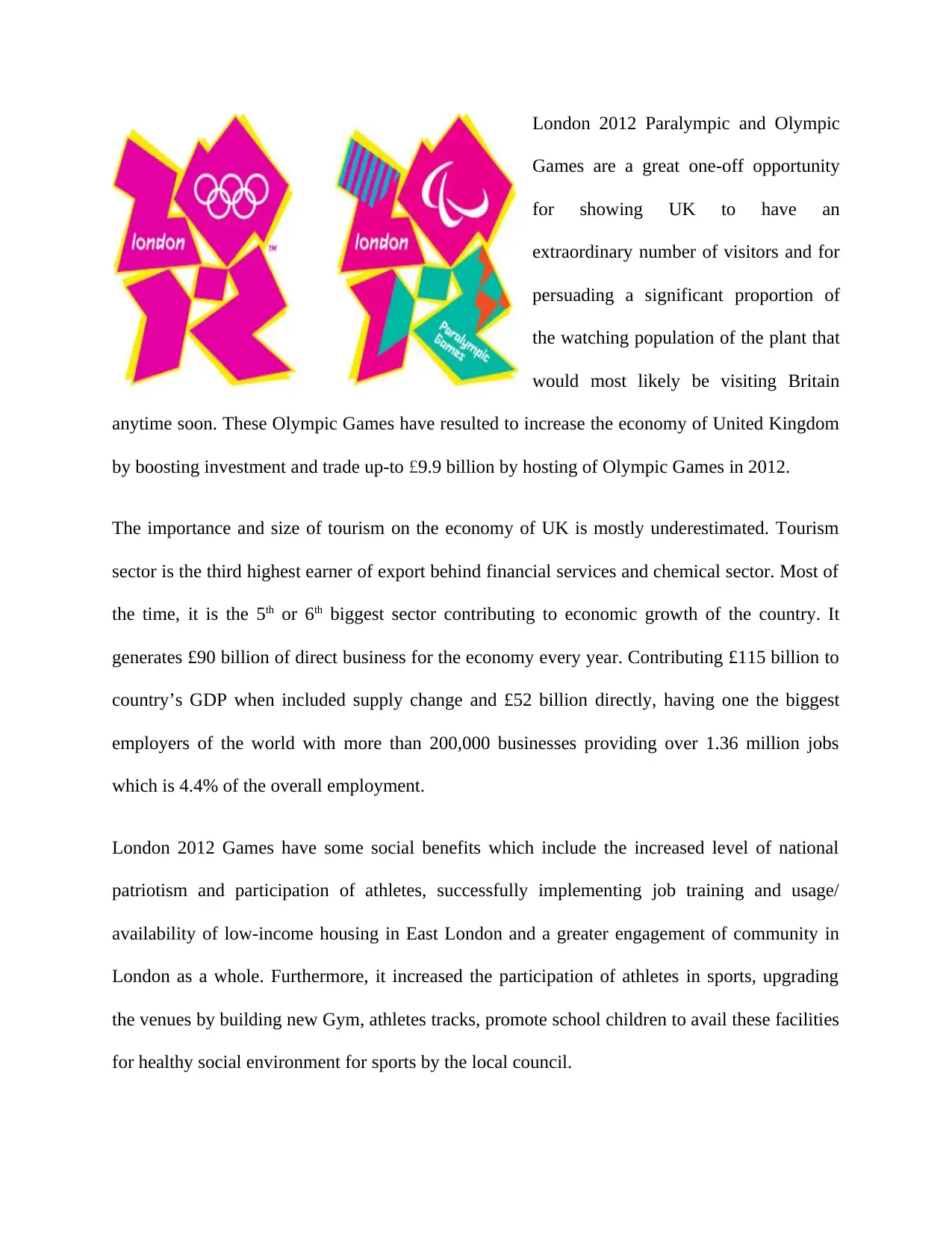
London 2012 Paralympic and Olympic
Games are a great one-off opportunity
for showing UK to have an
extraordinary number of visitors and for
persuading a significant proportion of
the watching population of the plant that
would most likely be visiting Britain
anytime soon. These Olympic Games have resulted to increase the economy of United Kingdom
by boosting investment and trade up-to £9.9 billion by hosting of Olympic Games in 2012.
The importance and size of tourism on the economy of UK is mostly underestimated. Tourism
sector is the third highest earner of export behind financial services and chemical sector. Most of
the time, it is the 5th or 6th biggest sector contributing to economic growth of the country. It
generates £90 billion of direct business for the economy every year. Contributing £115 billion to
country’s GDP when included supply change and £52 billion directly, having one the biggest
employers of the world with more than 200,000 businesses providing over 1.36 million jobs
which is 4.4% of the overall employment.
London 2012 Games have some social benefits which include the increased level of national
patriotism and participation of athletes, successfully implementing job training and usage/
availability of low-income housing in East London and a greater engagement of community in
London as a whole. Furthermore, it increased the participation of athletes in sports, upgrading
the venues by building new Gym, athletes tracks, promote school children to avail these facilities
for healthy social environment for sports by the local council.
Games are a great one-off opportunity
for showing UK to have an
extraordinary number of visitors and for
persuading a significant proportion of
the watching population of the plant that
would most likely be visiting Britain
anytime soon. These Olympic Games have resulted to increase the economy of United Kingdom
by boosting investment and trade up-to £9.9 billion by hosting of Olympic Games in 2012.
The importance and size of tourism on the economy of UK is mostly underestimated. Tourism
sector is the third highest earner of export behind financial services and chemical sector. Most of
the time, it is the 5th or 6th biggest sector contributing to economic growth of the country. It
generates £90 billion of direct business for the economy every year. Contributing £115 billion to
country’s GDP when included supply change and £52 billion directly, having one the biggest
employers of the world with more than 200,000 businesses providing over 1.36 million jobs
which is 4.4% of the overall employment.
London 2012 Games have some social benefits which include the increased level of national
patriotism and participation of athletes, successfully implementing job training and usage/
availability of low-income housing in East London and a greater engagement of community in
London as a whole. Furthermore, it increased the participation of athletes in sports, upgrading
the venues by building new Gym, athletes tracks, promote school children to avail these facilities
for healthy social environment for sports by the local council.
⊘ This is a preview!⊘
Do you want full access?
Subscribe today to unlock all pages.

Trusted by 1+ million students worldwide
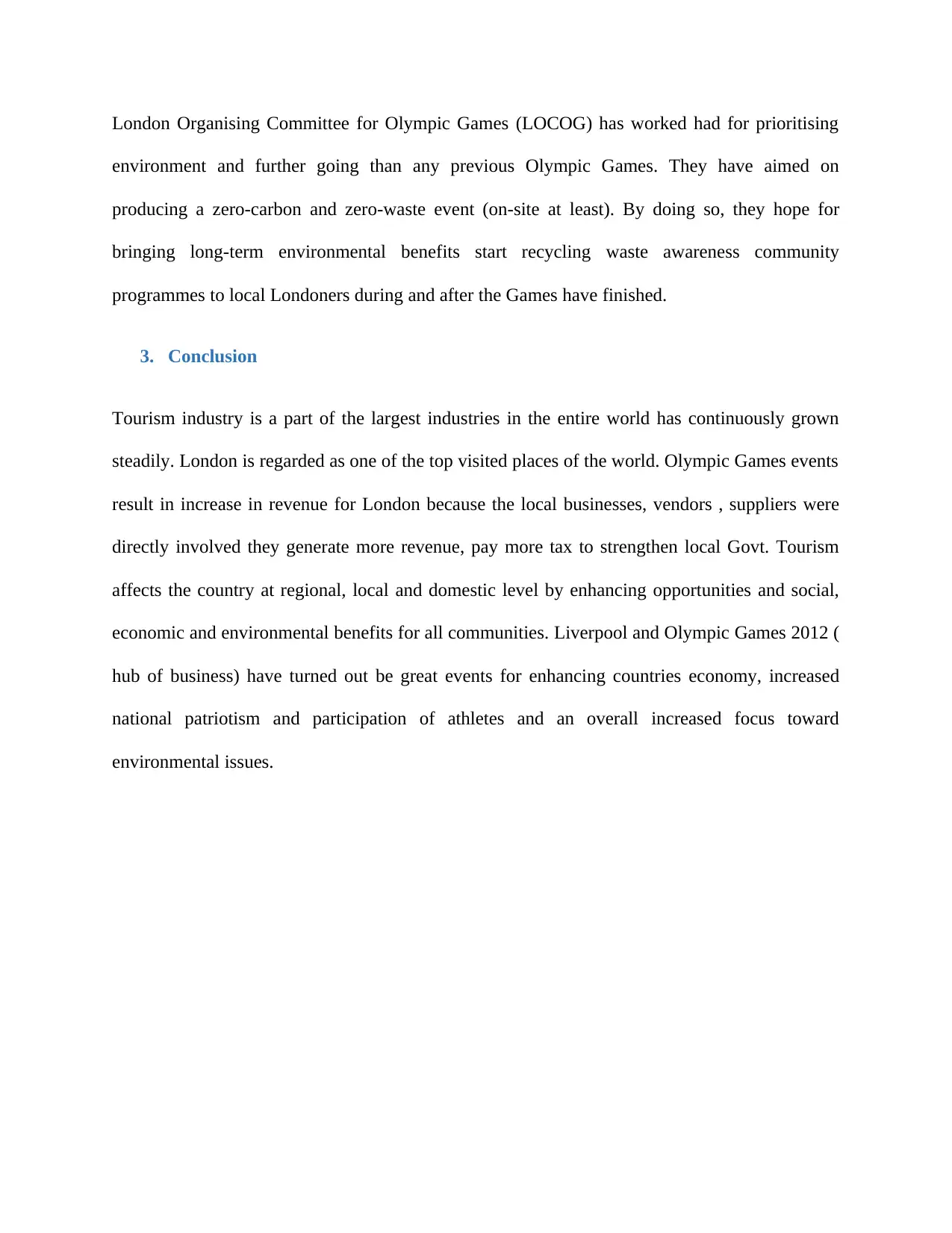
London Organising Committee for Olympic Games (LOCOG) has worked had for prioritising
environment and further going than any previous Olympic Games. They have aimed on
producing a zero-carbon and zero-waste event (on-site at least). By doing so, they hope for
bringing long-term environmental benefits start recycling waste awareness community
programmes to local Londoners during and after the Games have finished.
3. Conclusion
Tourism industry is a part of the largest industries in the entire world has continuously grown
steadily. London is regarded as one of the top visited places of the world. Olympic Games events
result in increase in revenue for London because the local businesses, vendors , suppliers were
directly involved they generate more revenue, pay more tax to strengthen local Govt. Tourism
affects the country at regional, local and domestic level by enhancing opportunities and social,
economic and environmental benefits for all communities. Liverpool and Olympic Games 2012 (
hub of business) have turned out be great events for enhancing countries economy, increased
national patriotism and participation of athletes and an overall increased focus toward
environmental issues.
environment and further going than any previous Olympic Games. They have aimed on
producing a zero-carbon and zero-waste event (on-site at least). By doing so, they hope for
bringing long-term environmental benefits start recycling waste awareness community
programmes to local Londoners during and after the Games have finished.
3. Conclusion
Tourism industry is a part of the largest industries in the entire world has continuously grown
steadily. London is regarded as one of the top visited places of the world. Olympic Games events
result in increase in revenue for London because the local businesses, vendors , suppliers were
directly involved they generate more revenue, pay more tax to strengthen local Govt. Tourism
affects the country at regional, local and domestic level by enhancing opportunities and social,
economic and environmental benefits for all communities. Liverpool and Olympic Games 2012 (
hub of business) have turned out be great events for enhancing countries economy, increased
national patriotism and participation of athletes and an overall increased focus toward
environmental issues.
Paraphrase This Document
Need a fresh take? Get an instant paraphrase of this document with our AI Paraphraser
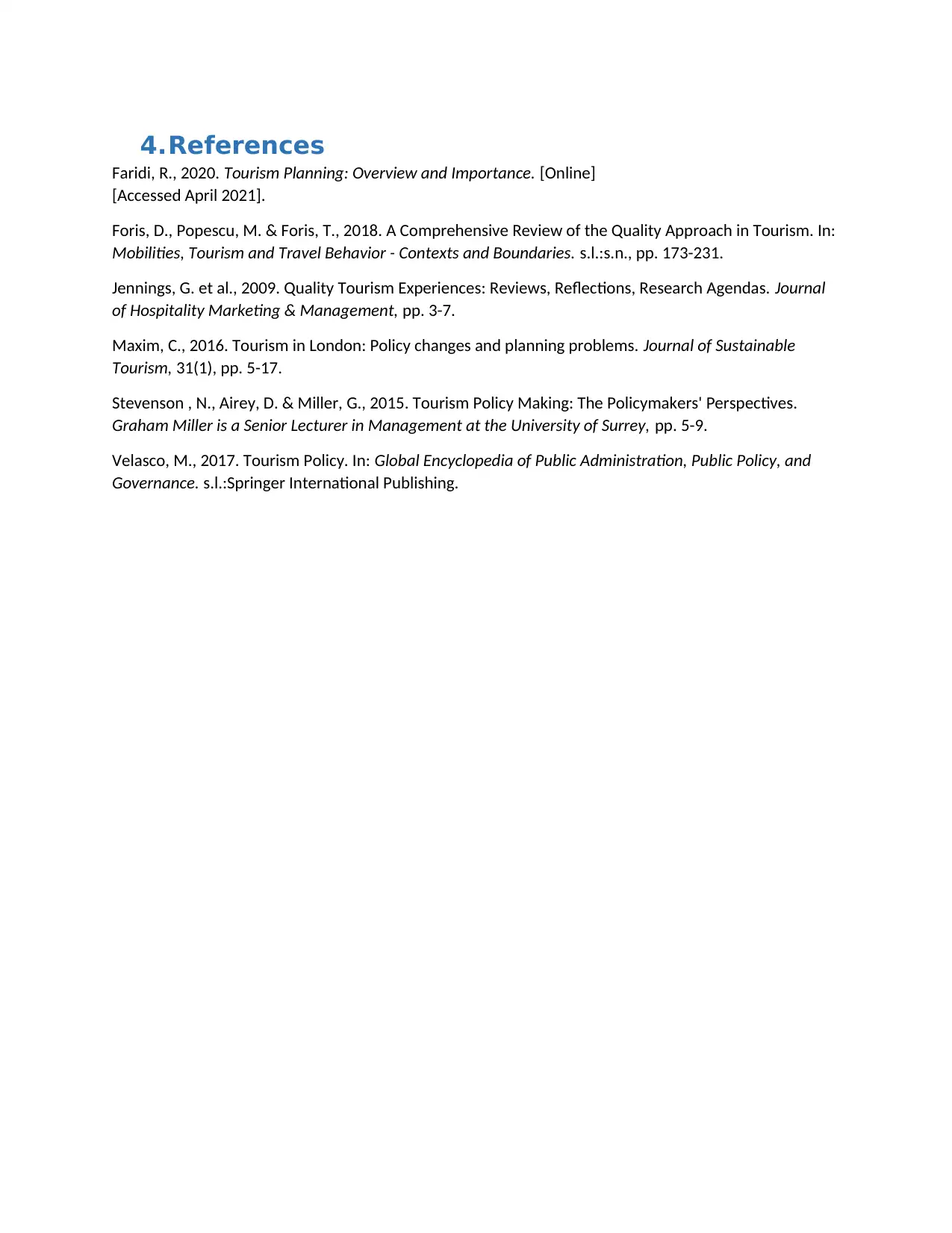
4.References
Faridi, R., 2020. Tourism Planning: Overview and Importance. [Online]
[Accessed April 2021].
Foris, D., Popescu, M. & Foris, T., 2018. A Comprehensive Review of the Quality Approach in Tourism. In:
Mobilities, Tourism and Travel Behavior - Contexts and Boundaries. s.l.:s.n., pp. 173-231.
Jennings, G. et al., 2009. Quality Tourism Experiences: Reviews, Reflections, Research Agendas. Journal
of Hospitality Marketing & Management, pp. 3-7.
Maxim, C., 2016. Tourism in London: Policy changes and planning problems. Journal of Sustainable
Tourism, 31(1), pp. 5-17.
Stevenson , N., Airey, D. & Miller, G., 2015. Tourism Policy Making: The Policymakers' Perspectives.
Graham Miller is a Senior Lecturer in Management at the University of Surrey, pp. 5-9.
Velasco, M., 2017. Tourism Policy. In: Global Encyclopedia of Public Administration, Public Policy, and
Governance. s.l.:Springer International Publishing.
Faridi, R., 2020. Tourism Planning: Overview and Importance. [Online]
[Accessed April 2021].
Foris, D., Popescu, M. & Foris, T., 2018. A Comprehensive Review of the Quality Approach in Tourism. In:
Mobilities, Tourism and Travel Behavior - Contexts and Boundaries. s.l.:s.n., pp. 173-231.
Jennings, G. et al., 2009. Quality Tourism Experiences: Reviews, Reflections, Research Agendas. Journal
of Hospitality Marketing & Management, pp. 3-7.
Maxim, C., 2016. Tourism in London: Policy changes and planning problems. Journal of Sustainable
Tourism, 31(1), pp. 5-17.
Stevenson , N., Airey, D. & Miller, G., 2015. Tourism Policy Making: The Policymakers' Perspectives.
Graham Miller is a Senior Lecturer in Management at the University of Surrey, pp. 5-9.
Velasco, M., 2017. Tourism Policy. In: Global Encyclopedia of Public Administration, Public Policy, and
Governance. s.l.:Springer International Publishing.
1 out of 11
Related Documents
Your All-in-One AI-Powered Toolkit for Academic Success.
+13062052269
info@desklib.com
Available 24*7 on WhatsApp / Email
![[object Object]](/_next/static/media/star-bottom.7253800d.svg)
Unlock your academic potential
Copyright © 2020–2026 A2Z Services. All Rights Reserved. Developed and managed by ZUCOL.




